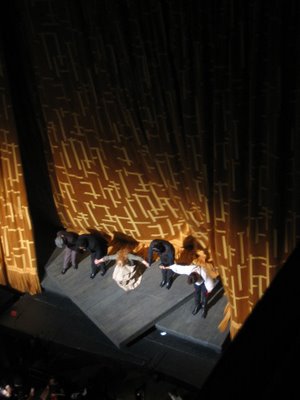 Gounod FAUST, Met 03.X.2006; c. de Billy; Swenson, Vargas, Abdrazakov, Hakala, Deshayes.
Gounod FAUST, Met 03.X.2006; c. de Billy; Swenson, Vargas, Abdrazakov, Hakala, Deshayes.
Faust is a pretty piece with pretty tunes. With a cast brimming with sex appeal and a conductor sensitive to Gounod's swagger and sway, an evening of Faust becomes a major musical event. That happened at the Met two seasons ago. This month, the Met brings the production back with house singers of solid repute. The good news is that Ruth Ann Swenson, New York's beloved light lyric, still has those magnificent top notes, huge, brilliant, gorgeous. The bad news is that Marguerite's music doesn't really make full use of them as much as, say, Adina's or Lucia's. Apart from those familiar climaxes (a few bars in the Jewel Song, and the like), not much happens in the stratosphere, and so Ruth Ann has to flex those drab mid-register tones more than she's used to. But when a high B-flat (or above) arrives in the score, it's magic! Her voice navigates an odd register break, suddenly launching creamy tones that are significantly louder and brighter than what preceeded them. Please, someone give the girl a bel canto role with a juicy mad scene. Meanwhile, Ramon Vargas, to my ears, is experiencing a drastic change in his instrument: once a beautiful and confident sound with a front-and-center ping, it now seems tentative, muffled, and fearful of high notes. A few seasons back, his Edgardos and Alfredos were youthful and elegant, fragrantly lyrical in the smallest detail; but then, Romeo last year wasn't up to his par, and this Faust is, I fear, another data point in an alarming downward trend.
As for the other singers: Ildar Abdrazakov, as Mephistopheles, doesn't have the wattage (or the decibel) of Rene Pape, but he delivered nuanced and committed singing throughout the evening. The Valentin, the debuting Finnish baritone Tommi Hakala, answered the grace deficit of the evening decisively. And he seemed quite binoculargenic, I can't wait to stalk him at the Met stage door. As Siebel, the other debutante Karine Deshayes unveiled an attractive and potentially world-class voice. And finally, without the stellar diversion of the threesome Alagna-Hvorostovsky-Pape, the production was naked in the full glory of its dullness.
 Sieglinde too busy to keep up with diary responsibilities. Please forgive. Went to Chicago for the Salome, saw Voigt bare her body (suit), heard Voigt bare her (uneven) vocal prowess. Will definitely say a few things about this soon. Meanwhile, back in New York in time for the Cav/Pag at the Met. Two words for M/V Maria Guleghina, the Oceanliner: German roles. (How about some Chrysothemis, or Elektra, or Sieglinde? Or the Siegfried and Götterdammerung Brünnhildes?) Gotta go.
Sieglinde too busy to keep up with diary responsibilities. Please forgive. Went to Chicago for the Salome, saw Voigt bare her body (suit), heard Voigt bare her (uneven) vocal prowess. Will definitely say a few things about this soon. Meanwhile, back in New York in time for the Cav/Pag at the Met. Two words for M/V Maria Guleghina, the Oceanliner: German roles. (How about some Chrysothemis, or Elektra, or Sieglinde? Or the Siegfried and Götterdammerung Brünnhildes?) Gotta go.





